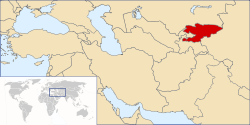Kyrgyzstan And Democracy: Outcomes Of Survey – Analysis
By JTW
By Gulay Mutlu
Kyrgyzstan has experienced two riots in five years. The first one, called the “Tulip Revolution,” overthrew Kyrgyzstan’s first president Askar Akayev in 2005. The second took place in 2010 and led to the ousting of Bakiyev. The latter was harsher and more violent. However, Kyrgyzstan was taking a “real step” toward democracy in an environment of ethnic violence. The new interim government led by Roza Otunbayeva fulfilled its mission with the presidential elections in October 2011.
The election was won by Almaz Atambayev. While the memories of clashes in 2010 are still fresh, Kyrgyzstan seemed to have taken lessons from the past. Although Bakiyev had accused the preceding government of authoritarianism, he also could not succeed in constitutional reforms and headed toward authoritarianism. However, learning from the past, the interim government wanted to change the constitutional regime from a presidential to parliamentary one. To do so, a referendum was held and 90% supported a parliamentary regime. With this strong support, the interim government initiated a reform movement.

Kyrgyzstan has become the first country in Central Asia to adopt democracy, and immediately attracted the interest of the international community. For example, in March, the International Crisis Group published a report analyzing the ethnic violence in the 2010 clashes. Moreover, the International Republican Institute has recently announced the results of a survey on Kyrgyz people’s opinions about social, political, and international relations matters in the new atmosphere. The results are quite interesting, and reveal many clues about Kyrgyzstan’s current situation.
Democratization and Domestic Politics
The survey results primarily show Kyrgyz people’s increasing belief in democracy. On the other hand, the survey also reveals the contradictions between the north and south. In 2005, after Akayev, leaders from the south and north had formed a coalition and ruled the country, but eventually, Bakiyev eliminated his associates from the north, thus making the south more dominant in the government. This caused the displeasure of the north and triggered the riot in 2010. Today, the study shows that 67% of people in the north believe in democracy, while this number is only 46% in the south. Therefore, it is obvious that the divide between the north and south in Kyrgyz politics is still an important factor. On the other hand, since September 2011, the percentage of people that are convinced democracy has flowered has increased from 42% to 53%. This indicates that the new government seems promising with regard to democracy.
Furthermore, the percentage of people believing that an active opposition is essential for democracy has increased from 62% to 74% since 2011. This strong support shows how democratic consciousness has increased among Kyrgyz people.
The survey results also show that the most significant problems of Kyrgyzstan are unemployment, corruption and an underdeveloped economy. Public opinion on these three trending topics has barely changed since 2011. Today, 96% of people still consider corruption a major problem. This figure was pretty much the same before the election.
The three things that people were concerned about the most were a possible civil war (54%), unemployment (33%), and the future of the country (28%) before the election. After the election, concern about civil war has dropped by 10% to 44%. The second major concern has become instability with 36%, and unemployment (35%) has become the third.
Kyrgyzstan Foreign Policy
The most interesting result of the survey regarding Kyrgyzstan’s foreign policy is that a considerable portion of Kyrgyz people favor reuniting with Russia in times of crisis. The majority wishes to remain a separate independent country, but 63% of the people consider reuniting with Russia as an option in hard times. Nevertheless, in a previous survey the figure was 75%. Therefore, the belief that Kyrgyzstan can sustain an independent country in such a challenging region seems to be strengthening.
Kyrgyz people believe that Russia is Kyrgyzstan’s most important partner, followed by Kazakhstan and Turkey. In 2011, the European Union and Turkey shared ranks with 68%. After the election, Turkey gained 80% support (it was 66% before the election) and has become third in Kyrgyzstan’s best partners list. This can be explained with the effect of close relations between President Abdullah Gül and President Almaz Atambayev on Kyrgyz people. After the election, the first state visit was held by President Gül, and President Atambayev made his first visit to Turkey.
Public opinion about the United States, which holds a controversial military base in Kyrgyzstan, is also interesting. According to the survey results, the percentage of people who sees the U.S. as a threat has increased from 34% (2011) to 42% (2012). Moreover, the U.S. is considered to be the third-most influential political actor in Kyrgyz politics.
Conclusion
The survey clearly demonstrates the public perception of Kyrgyz domestic politics and foreign policy. The results indicate that the newly-adopted parliamentary regime is facilitating democracy, and the public’s belief in democracy is continuously increasing. Public support for the opposition parties reflects a change in mentality. Moreover, increasing stability is a positive sign of the strengthening roots of its democracy. Today, Kyrgyz democracy and its progress mean a lot not only for Kyrgyzstan, but also for the other countries in the region. In that respect, Kyrgyzstan has the potential to become an island of stability and democracy in a sea of authoritarian neighbors, but in the meantime, these neighbors may perceive Kyrgyzstan as a potential “threat” to their regimes.
